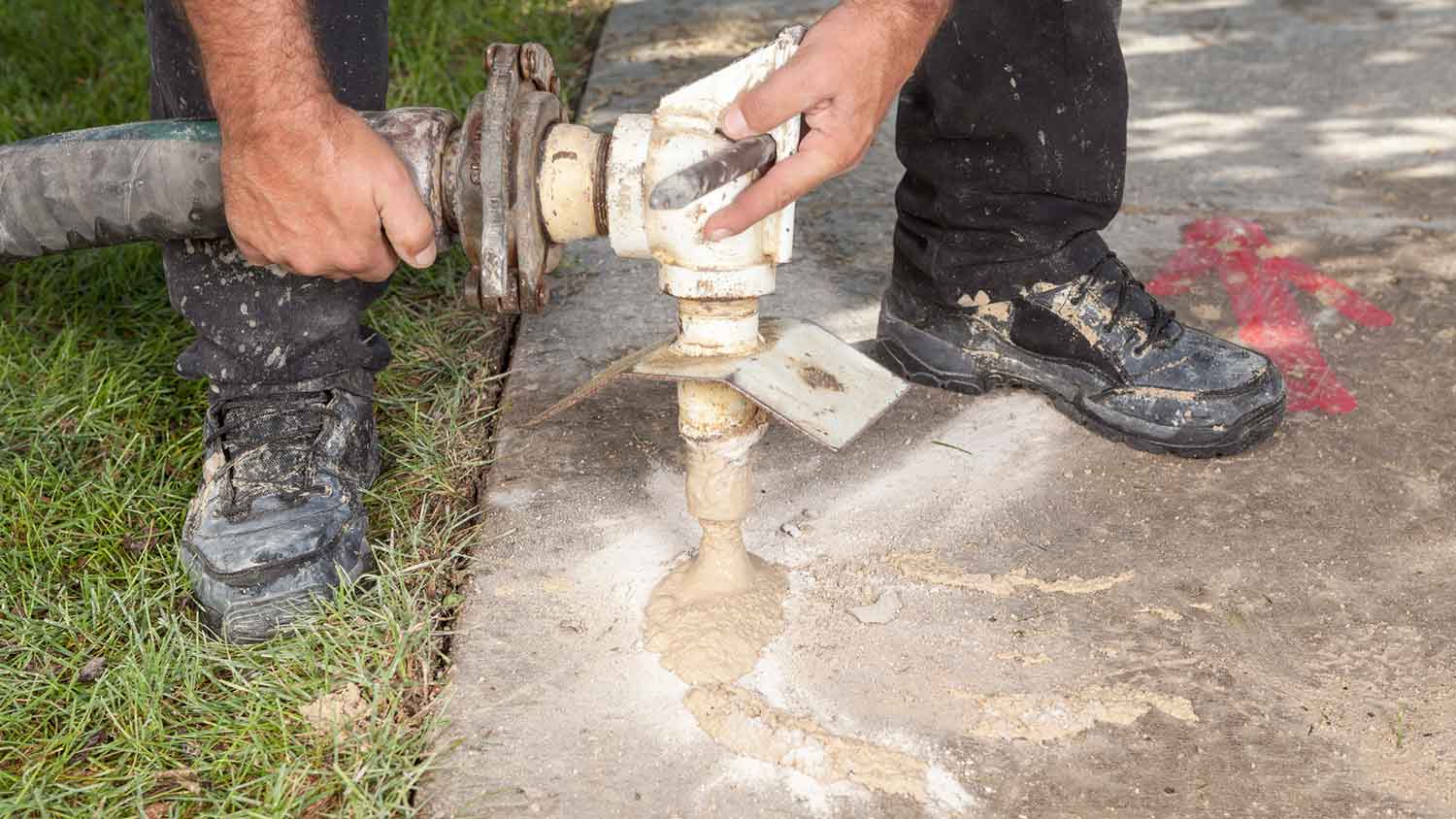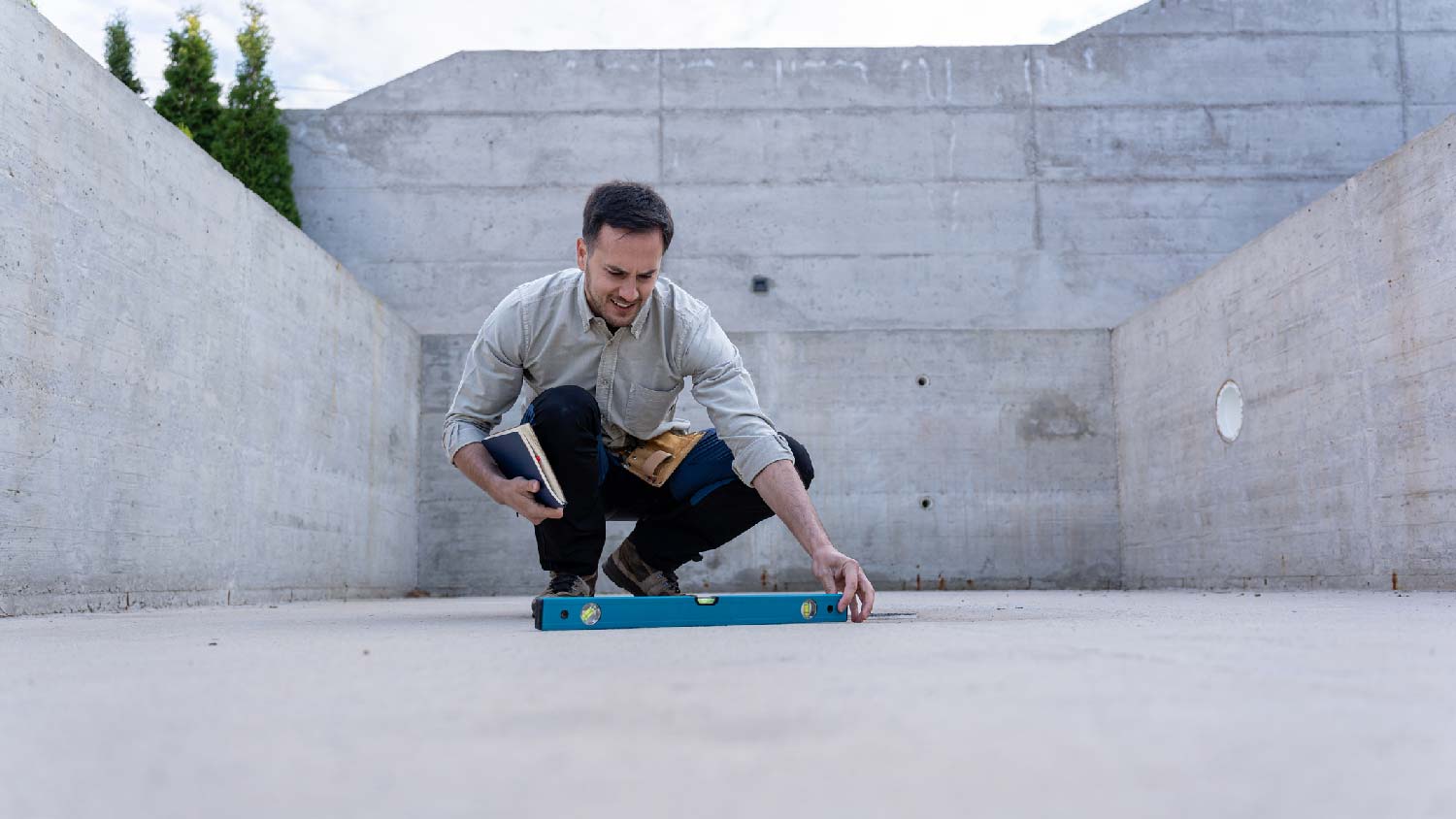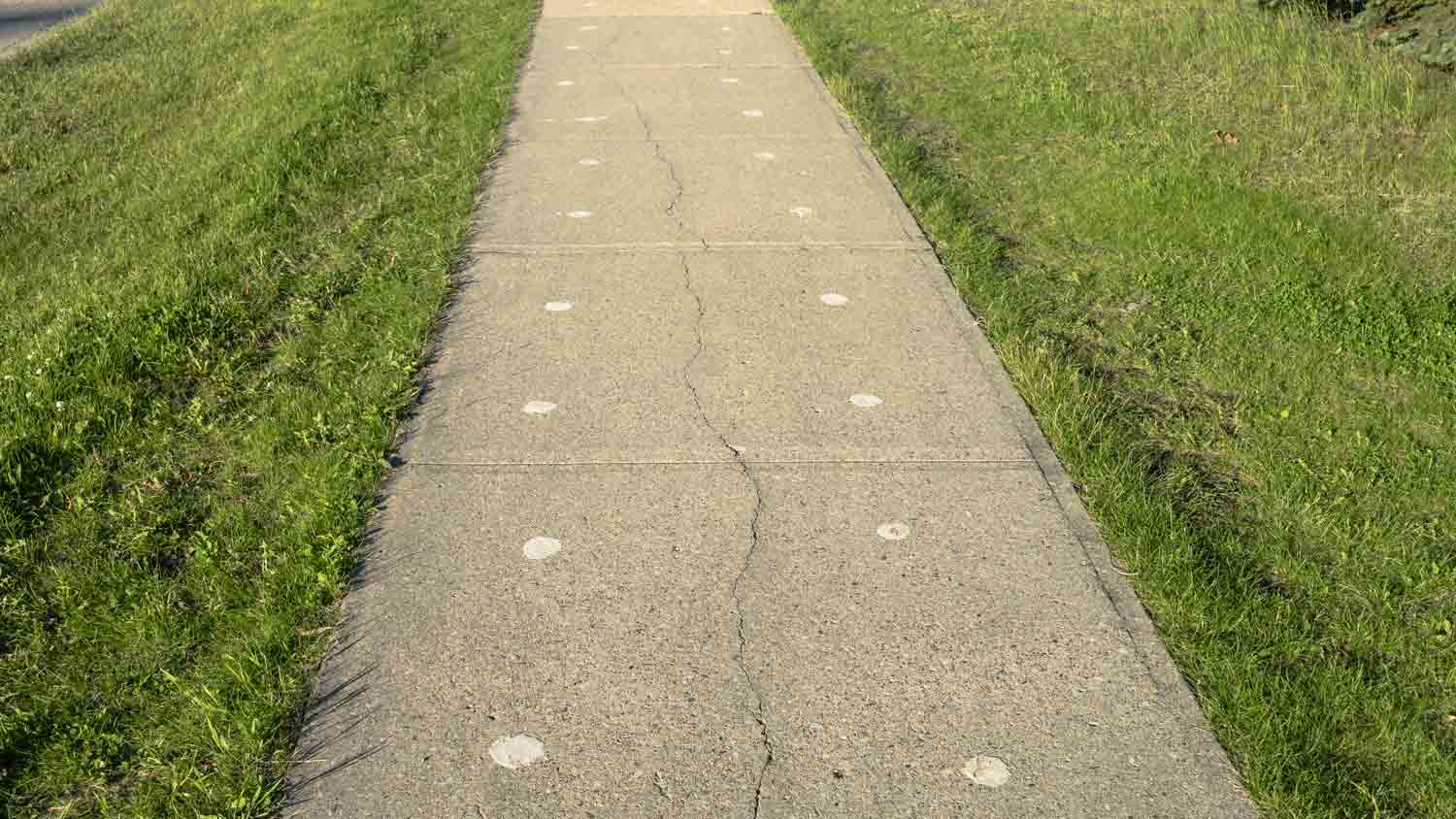
Wondering about mudjacking costs? Discover prices, key cost factors, and tips to save on your concrete leveling project.
Concrete leveling costs an average of $1,229, and most homeowners pay between $662 and $1,866 for the service. Prices vary based on leveling method and square footage, so get an estimate from a professional for accurate pricing.


Concrete leveling is the process of lifting tilted or uneven concrete slabs, leveling them properly and providing long-term support.
The easiest and most DIY friendly option for leveling concrete is injecting a self-leveling compound which typically costs $1-5 per square foot, while the most expensive option is “polyjacking” or lifting with polyurethane, which costs between $5 and $25 per square foot.
Other key cost factors include the type of concrete project, as a walkway or steps are relatively inexpensive to level but a driveway or foundation can cost well over $10,000.
If the concrete is badly damaged, replacing it entirely may be a better option than trying to level it.
Concrete leveling almost always requires the work of a professional because of the size and complexity of the project, but you can look for savings by getting multiple estimates.
The price range for concrete leveling is so large because many factors play a role in your pricing. Make sure to consider all of the following to get the most accurate cost estimate possible.
There are a few different methods your professional can use to level your concrete slab, and the most appropriate method will determine your concrete leveling costs. A self-leveling compound is, by far, the most affordable option, totaling between $1 and $5 per square foot. Polyurethane concrete lifting costs between $5 and $25 per square foot and is the most expensive option.
| Leveling Method | Cost per Sq. Ft. |
|---|---|
| Self-leveling compound | $1–$5 |
| Mudjacking | $3–$6 |
| Sandjacking | $3–$8 |
| Slabjacking | $3–$20 |
| Polyjacking | $5–$25 |
Using a self-leveling concrete compound costs just $1 to $5 per square foot, and this method is easy to DIY, so you could pay even less if you’re willing to do the work yourself. A self-leveling compound is only a suitable option if the underlying issue that caused the sinking concrete is resolved and the slab has sunk less than an inch. It’s most common for minimal sinking of slab foundations and basement floors.
Mudjacking costs between $3 and $6 per square foot, and it’s suitable for more severe concrete sinking. It involves a professional pumping cement under a slab to lift it back into place. This is a good option for sidewalks, patios, walkways, pool decks, and concrete driveways.
Sandjacking costs between $3 and $8 per square foot. The process is similar to that of mudjacking, but your pro will use compacted sand instead of cement. It weighs less and may be a better option if soil instability caused your original issue. Sandjacking provides less support, so it’s not ideal for foundations or driveways, but it’s suitable for patios, walkways, and sidewalks.
Slabjacking costs $3 to $20 per square foot. Slabjacking is really just mudjacking that a professional performs on a sinking foundation. The higher cost is due to more limited access to the slab and the more intensive preparation necessary to avoid foundation damage. This is a good option for slab foundations or sunken basement floors.
Polyjacking is the most expensive concrete leveling method at between $5 and $25 per square foot. The process is similar to mudjacking, but your pro uses expanding polyurethane foam to lift the concrete instead of cement. Polyurethane weighs far less than cement, so this can help avoid future sinking due to added weight over unstable soil. Polyjacking is overkill for sidewalks and patios, but it can be one of the more permanent solutions for foundations and concrete driveways.
Most concrete leveling companies charge based on the square foot, with an average cost of $4 and prices ranging from $3 to $25. In all cases, the size of the slab you need to be lifted will play an important role in your costs. For smaller projects, you can expect to pay a minimum trip fee of $150.
| Slab Size (Sq. Ft.) | Average Cost | Cost Range |
|---|---|---|
| 10 | $150 | $150–$250 |
| 25 | $150 | $150–$250 |
| 50 | $200 | $200–$300 |
| 100 | $400 | $300–$600 |
| 250 | $1,000 | $750–$1,500 |
| 500 | $2,000 | $1,500–$3,000 |
If you’re not sure which concrete leveling method would be best for your project, or you don’t know the square footage of the portion of concrete you need to be lifted, you can get a rough estimate for your total cost based on the specific project. Sidewalk leveling, for example, will almost always be more affordable than driveway leveling or patio leveling due to the smaller square footage and easier access.
| Leveling Project | Cost Range |
|---|---|
| Concrete steps | $200–$500 |
| Driveway | $600–$3,000 |
| Foundation | $4,500–$37,500 |
| Garage floor | $1,100–$2,200 |
| Patio | $600–$3,200 |
| Pool deck | $300–$600 |
| Sidewalk | $300–$1,800 |
Labor accounts for between 50% and 70% of your concrete leveling costs, or an average of between $625 and $875. Labor costs can sit lower for easily accessible slabs, like sidewalks and concrete walkways, and they can climb significantly higher if your professional needs to lift a sinking section of your home foundation.
Labor costs can also go up if you need finishing services after the concrete lifting is done. For example, you could pay between $100 and $500 to restore a finished floor over a concrete slab after slabjacking.

Concrete leveling will almost always be more affordable than removing the old slab and pouring a new one. Concrete leveling costs an average of $4 per square foot and ranges from $3 to $25 per square foot, while complete replacement costs an average of $10 per square foot and can climb to $100 or more if you need to replace a portion of your home foundation.
It’s best to speak with a professional who handles concrete lifting about what type of concrete leveling is best for your situation. Most concrete leveling specialists can also get you an estimate for replacing the slab for direct comparison.
Concrete leveling isn’t a job for amateurs. This is typically a large repair project that requires the expertise of a local concrete mudjacking pro with plenty of experience and the tools for lifting concrete safely.
You should hire a concrete pro for leveling for many reasons, including:
Most concrete projects are too large to safely level without professionals. Trying to inject materials to lift up the concrete at the wrong points will only break it further.
Professionals have access to equipment and materials for the lifting process that homeowners do not.
Pros can recommend the right leveling approach, where to begin, and determine if other concrete around the house needs the same treatment.
Professionals can offer advice on whether the concrete should be replaced entirely instead of leveled.
We only recommend DIY concrete level in rare cases, such as dealing with small concrete steps or a concrete slab in a walkway. Here are important factors to keep in mind:
Avoid leveling concrete that has already cracked or split. That’s beyond a DIY project or needs to be replaced completely.
Focus on small projects, such as steps or concrete blocks, which can be safely dug under or injected without large equipment.
Use a self-leveling compound and follow directions carefully.
As with any project that may require excavation, know the location of your irrigation lines and other important underground features.
Concrete leveling can get expensive quickly, but there are some things you can do to keep costs down.
Choose the most affordable method that solves your issue: Speak with a pro about which options are suitable for leveling your concrete, and then choose the one that provides the best value. Going with mudjacking might be more affordable up front, but if it could make the issue worse over time, splurging on polyjacking will save in the long run.
DIY the buildback: If you’re leveling a slab foundation or a basement floor under finished flooring, tackling the flooring repairs yourself after your professional finishes can save you some money on the buildback. This will only save $100 to $500, but every dollar counts.
Fix the underlying issue: Concrete sinks when the soil beneath it isn’t providing proper support, so the best way to avoid ongoing expenses is to fix the underlying problem. That could mean filling in a sinkhole or installing a drainage system, which will cost more up front but will save you money over time.
Get multiple estimates: Finally, get at least three estimates from local professionals for the work. Compare based on past customer reviews, testimonials, project cost, and overall value.
If your concrete shows clear damage or tilting, include photos when you ask for an estimate from a concrete pro.
Provide the size in square feet of your uneven concrete if possible, and prepare to discuss when the problem began.
Expect an in-person estimate before a pro can suggest the right lifting and leveling method for the project, which will determine the cost.
Before the project begins, move vehicles and other objects away from the concrete.
Home is the most important place on earth, which is why Angi has helped more than 150 million homeowners transform their houses into homes they adore. To help homeowners with their next project, Angi provides readers with the most accurate cost data and upholds strict editorial standards. We extensively research project costs to develop the pricing data you see, so you can make the best decisions for you and your home. We rely on reputable sources, including the U.S. Bureau of Labor Statistics, academic journals, market studies, and interviews with industry experts—all to ensure our prices reflect real-world projects.
Want to help us improve our cost data? Send us a recent project quote to [email protected]. Quotes and personal information will not be shared publicly.
From average costs to expert advice, get all the answers you need to get your job done.

Wondering about mudjacking costs? Discover prices, key cost factors, and tips to save on your concrete leveling project.

DIY mudjacking is an advanced task, but learning how to raise a concrete slab is great to know for many scenarios. Let's take a look at how to DIY mudjack.

Sunken concrete slabs can quickly get expensive to raise back up. Learn about polyurethane concrete lifting costs to see how you should budget.
Learn about concrete leveling and how it can fix uneven surfaces, from sunken sidewalks to uneven driveways, and boost your home’s safety and curb appeal.

Sunken concrete can be a structural issue, but a professional can easily repair it. Ask these concrete injection leveling and mudjacking questions before you hire.

Leveling concrete slabs around your home is no small feat. Learn who to call to level your concrete slab and why they’re the right choice.